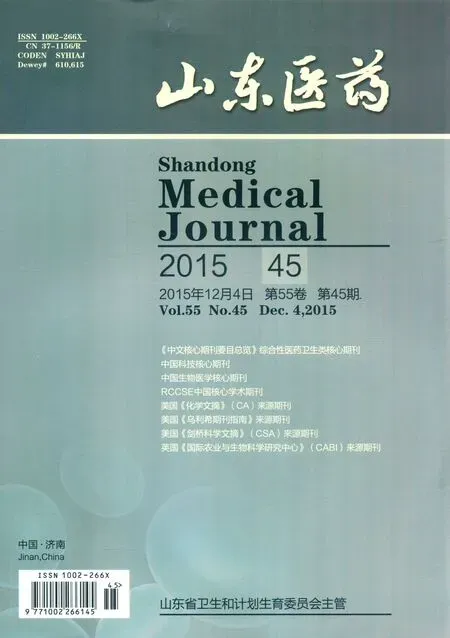阿片类受体与肝癌关系的研究进展
·综述·
阿片类受体与肝癌关系的研究进展
周成茂,阮林
(广西医科大学附属肿瘤医院,南宁530021)
摘要:阿片类受体和肝癌之间有紧密联系,可直接或间接促进肝癌的发生发展。阿片类受体除了可以调控肝癌细胞的增生、转移和凋亡外,还有望成为一种新的肝癌标志物。深入研究阿片类受体与肝癌的关系,可对肝癌临床诊疗和癌症疼痛药物开发提供新的思路。
关键词:肝肿瘤;阿片类受体;阿片类受体激动剂
doi:10.3969/j.issn.1002-266X.2015.45.038
中图分类号:R735.7文献标志码:A
基金项目:广西自然科学基金资助项目(2014GXNSFAA118224)。
收稿日期:(2015-07-28)
通信作者:阮林
原发性肝癌主要为肝细胞癌 (HCC),是世界上第五大常见癌症,病死率高[1]。手术(包括肝移植在内的方法)是肝癌最有效的治疗方法,但总体效果欠佳[2]。因此,在肝癌患者治疗过程中需多个学科的共同参与[3]。早在1987年,阿片类受体就被发现普遍存在于人类和动物肿瘤细胞中[4]。而这些阿片类受体又可分为μ受体、δ受体、κ受体和阿片样物质受体(OGFR)四种类型,这些受体被激活后可起到镇痛镇静等作用[5]。阿片类受体激动剂药物是肝癌患者不可缺少的药物,因其不仅能为肝癌患者提供良好的手术麻醉镇痛效果,还能为晚期肝癌患者提供良好的止痛效果。近年来诸多研究表明阿片类受体与肝癌之间有密切关系。但在阿片类受体相关肝癌细胞增生、侵袭和凋亡的领域中,存在许多争议。且在正常肝脏细胞和肝癌细胞中,阿片类受体的表达水平同样对这两类细胞有重要影响。现就阿片类受体与肝癌的关系研究进展情况进行综述。
1阿片类受体间接促进肝癌的发生发展
1.1阿片类受体对多个促进肝癌发生发展的因素起积极作用乙肝和肝硬化是肝癌形成最主要的危险因素,同时乙醇、黄曲霉素、胰岛素抵抗等对肝癌形成亦起重要作用[6]。众所周知,肝纤维化和胆汁淤积等是肝硬化形成的重要原因,而阿片受体与它们密切关联:①在阿片类受体相关肝纤维化形成的方面,已有研究证明阿片类受体被激活后,可通过调节肝星状节细胞的增生等,从而参与肝硬化形成的过程[7]; ②阿片类受体在胆汁淤积形成过程中扮演重要角色[8]。另外,有荟萃分析表明,糖尿病会增加患者肝癌形成的风险[9],同时又由于高血糖在糖尿病发生发展中起到重要作用及阿片类受体被活化时机体血糖会相应提高[10,11],它们三者之间因此有密切关系。以上这些文献提示在肝癌或急慢性肝病患者中,阿片类受体激动剂药物的使用应慎重。同时,阿片类受体的表达情况与肝炎的发生发展也颇有争议。当δ阿片类受体呈高表达时,会弱化干扰素或抗病毒药物治疗肝炎的效果[12]。
1.2阿片类受体对正常肝细胞有保护作用研究[13]发现,δ阿片类受体被激活时,其可以通过PKC信号通路抑制线粒体凋亡途径,进而起到保护正常肝细胞的作用。同样μ阿片类受体被激活时,却可预防肝脏的炎症发作,因此,倘若能错开与化疗药物的使用时期,其应是一个很有前途的缓解肝脏慢性疾病的治疗靶点[14]。
2 阿片类受体直接促进肝癌的发生发展
肿瘤复发和转移一直是肝癌患者治疗预后的一个棘手难题,其主要的问题是涉及到如何处理肝癌细胞的增生、转移和凋亡等。这个过程受到多个信号通路的调控,而阿片受体亦参与了这个过程。多个研究表明阿片类受体主要是通过其表达程度的变化来影响肝癌细胞的生物学行为,但研究结果之间亦互相矛盾。
有研究[15]发现,在体内和体外,当肝癌细胞中的μ阿片类受体表达程度下调时,通过调节MKK7-JNK通路,进而抑制肝癌细胞的增殖,从而明显延迟了肿瘤的生长。Tang等[16]发现DOR基因被沉默后,肝癌细胞MHCC97的侵袭率和迁移率明显降低,并且在裸鼠接种实验中, DOR的低表达水平和低肿瘤形成率呈正相关。另外,Avella等在肝癌细胞中发现OGF-OGFr轴,而且其能调节肝癌细胞的增殖,不过,这种作用是可逆的[17]。但不同浓度的δ- 阿片类受体激动剂可通过PKC通路抑制肝癌细胞HepG2的增殖[18]。另外, N / OFQ基因是一种新的阿片类受体基因,可作为肝细胞癌的一种新特定标志[19]。血衍吗啡素-6是一种能与阿片类受体结合进而发挥生物学效应的阿片类肽,仅在肝癌细胞中存在,不存在于正常肝细胞中,这提示其与肝癌细胞的进展存在某种关联[20]。
有荟萃分析[21]结果间接指出,减少阿片类受体激动剂药物的使用可以增加癌症患者的生存率,同样,最近的队列研究分析结果[22]亦表明阿片类受体激动剂药物的使用与癌症患者的生存率呈负相关。 尽管目前尚无研究表明阿片类受体激动剂药物可影响肝癌患者的生存率。但阿片类药物在肝脏疾病的使用过程中,可以加剧肝脏疾病的恶化程度[23]。
综上所述,阿片类受体表达可随着肝癌的进展而变化,并且能对肝癌细胞的增生、凋亡和侵袭性进行调控。除此之外,其可能成为一种新的肝癌标志物,这对肝癌诊断有一定临床意义。另外,阿片类受体的高表达状态能对正常肝细胞起保护作用,但对一些急慢性肝脏疾病的治疗有所阻碍;而低表达时可抑制肝癌细胞的发生发展。临床阿片类受体激动剂的应用对肝癌患者的生存率可能无益处。
参考文献:
[1] El Serag HB, Rudolph KL. Hepatocellular Carcinoma: Epidemiology and Molecular Carcinogenesis[J]. Gastroenterology, 2007,132(7):2557-2576.
[2] Rampone B, Schiavone B, Martino A, et al. Current management strategy of hepatocellular carcinoma[J]. World J Gastroenterol, 2009,15(26):3210-3216.
[3] Dubray BJ, Chapman WC, Anderson CD. Hepatocellular carcinoma: a review of the surgical approaches to management[J]. Mo Med, 2011,108(3):195-198.
[4] Zagon IS, Mclaughlin PJ, Goodman SR, et al. Opioid receptors and endogenous opioids in diverse human and animal cancers[J]. J Natl Cancer Inst, 1987,79(5):1059-1065.
[5] Dhawan BN, Cesselin F, Raghubir R, et al. International Union of Pharmacology. XII. Classification of opioid receptors[J]. Pharmacol Rev, 1996,48(4):567-592.
[6] Gomaa A, Khan S, Toledano M, et al. Hepatocellular carcinoma: epidemiology, risk factors and pathogenesis[J]. WJG, 2008,14(27):4300-4308.
[7] De Minicis S, Candelaresi C, Marzioni M, et al. Role of endogenous opioids in modulating HSC activity in vitro and liver fibrosis in vivo[J]. Gut, 2008,57(3):352-364.
[8] Nicoll J, Axiotis CA, Bergasa NV. The delta opioid receptor 1 is expressed by proliferating bile ductules in rats with cholestasis: implications for the study of liver regeneration and malignant transformation of biliary epithelium[J]. Med Hypotheses, 2005,65(6):1099-1105.
[9] Tanaka K, Tsuji I, Tamakoshi A, et al. Diabetes Mellitus and Liver Cancer Risk: An Evaluation Based on a Systematic Review of Epidemiologic Evidence among the Japanese Population[J]. Jpn J Clin Oncol, 2014,44(10):986-99.
[10] Khawaja XZ, Green IC, Thorpe JR, et al. The occurrence and receptor specificity of endogenous opioid peptides within the pancreas and liver of the rat. Comparison with brain[J]. Biochem J, 1990,267(1):233-240.
[11] Yeh MC, Chen LJ, Niu HS, et al. Signals for increase of mu-opioid receptor expression in muscle by hyperglycemia[J]. Neurosci Lett, 2014,582(17):109-114.
[12] Floreani A, Antoniazzi S, Mescoli C, et al. Hepatic Methionine-enkephalin may interfere with response to antiviral therapy in chronic hepatitis C[J]. Eur J Gastroenterol Hepatol, 2012,24(4):427-430.
[13] Tang B, Zhang Y, Liang R, et al. Activation of the delta-opioid receptor inhibits serum deprivation-induced apoptosis of human liver cells via the activation of PKC and the mitochondrial pathway[J]. Int J Mol Med, 2011,28(6):1077-1085.
[14] Chakass D, Philippe D, Erdual E, et al. micro-Opioid receptor activation prevents acute hepatic inflammation and cell death[J]. Gut, 2007,56(7):974-981.
[15] Lu J, Liu Z, Zhao L, et al. In vivo and in vitro inhibition of human liver cancer progress by downregulation of the μ-opioid receptor and relevant mechanisms[J]. Oncology Reports, 2013,30(4):1731-1738.
[16] Tang B, Li Y, Yuan S, et al. Upregulation of the delta opioid receptor in liver cancer promotes liver cancer progression both in vitro and in vivo[J]. Int J Oncol, 2013,43(4):1281-1290.
[17] Avella DM, Kimchi ET, Donahue RN, et al. The opioid growth factor-opioid growth factor receptor axis regulates cell proliferation of human hepatocellular cancer[J]. Am J Physiol Regul Integr Comp Physiol, 2010,298(2):R459-R466.
[18] Tang B, Du J, Gao ZM, et al. DADLE suppresses the proliferation of human liver cancer HepG2 cells by activation of PKC pathway and elevates the sensitivity to cis-diammine dichloridoplatium[J]. Zhonghua Zhong Liu Za Zhi, 2012,34(6):425-429.
[19] Szalay F, Hantos MB, Horvath A, et al. Increased nociceptin/orphanin FQ plasma levels in hepatocellular carcinoma[J]. World J Gastroenterol, 2004,10(1):42-45.
[20] 周迈,彭吉润,王红霞,等.肝癌患者体内检测出血衍吗啡素-6[J].中华肝脏病杂志,2005,13(8):617.
[21] Chen WK, Miao CH. The effect of anesthetic technique on survival in human cancers: a meta-analysis of retrospective and prospective studies[J]. PLoS One, 2013,8(2):e56540.
[22] Chang WP, Lin CC. Use of opioid analgesics or sleeping medication and survival of cancer patients[J]. Eur J Oncol Nurs, 2015,19(3):199-206.
[23] Bosilkovska M, Walder B, Besson M, et al. Analgesics in patients with hepatic impairment: pharmacology and clinical implications[J]. Drugs, 2012,72(12):1645-1669.

